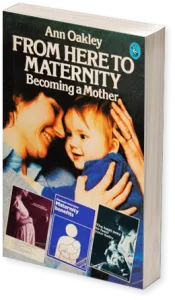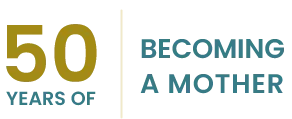About the project
 In the last decades of the 20th Century, Professor Ann Oakley's ground-breaking 'Becoming a Mother' project:
In the last decades of the 20th Century, Professor Ann Oakley's ground-breaking 'Becoming a Mother' project:
- Reshaped thinking about motherhood
- Established a multi-disciplinary area of academic
research - Provoked a sea-change in practice and policy around
maternity care
In a time of accelerating social change this project takes forward that legacy.
Methodology

Demographic, cultural and medical changes since the 1970s have significantly changed the context in which women become mothers: maternity services and childcare provision are vastly different, as are ideas about family life, gender roles and ‘parenting’ more broadly.
We take an inter-generational, longitudinal, and historically comparative approach.
We will understand better the:
- lasting implications of women's transition to motherhood, and
- continuities and changes in women's experiences over the last 50 years in the UK.
We will do this through both the re-analysis of Oakley's previous research and new data-collection.
History
Follow-up Study with Original Mothers (and Daughters/Grand-daughters): Looking Back on 50 Years of Motherhood LBBAMA50, 2025-6
Repeat Study with New Mothers: Becoming a Mother Repeated, 50 Years on BAMR50 2025-27
Aims
Aim 1
To compile, digitise, transcribe, catalogue, archive and re-analyse data from the original Becoming a Mother study (and associated studies). This will be in collaboration with the British Library (our official partner) as part of their acquisition of Oakley’s archive.
Aim 2
Based on (1), conduct follow-up interviews with those original mothers (and any grand/daughters who have become mothers). This will identify intergenerational changes in the transition to motherhood, potentially over three generations.
Aim 3
Based on (1) and (2), in combination with a historical policy review, develop a new interview schedule. We will conduct a methodologically similar study with an intersectionally diverse sample of mothers recruited via the same hospital in London. This will reflect and reveal historical change in the experience of first-time motherhood ‘50 years on’.
Aim 4
Drawing on (1) (2) and (3), to develop and share our findings with a wide audience through:
- academic and non-academic publications, including policy briefs
- an embedded television documentary and podcast, and
- a launch event (in the House of Lords) and dissemination event (at the British Library) publicised across a variety of media platforms.
Substantively, this project will contribute to understanding the transition to (and experience of) motherhood and contextualised by changes to parenting culture.
It will also:
- strengthen social science methodology,
- showcase ways of collecting and analysing qualitative data over time, and
- ensure the legacy of historically important data-sets.
In curating a research-ready data-set for re-use, the project serves not only as a study of motherhood, but as a study of the study of motherhood.
We hope our ‘50 years on’ study will be equally impactful as the original and have a lasting impact on public discourse and social policy, offering us a timely portrait of how motherhood – and indeed Britain – have changed.
